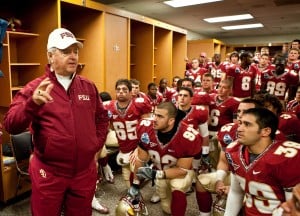
In his 44 years as a head football coach, Bobby Bowden compiled 377 wins (second most all-time) and two national championships (1993 and 1999).
But Bowden is just as known for his Southern charm and outspoken Christian beliefs. In this Inspiring Athletes interview with Bowden (who retired after the 2009 season), he talks about how his faith and how it guided him throughout his career.
Chad Bonham: You’ve always worn your faith on your sleeve. How did your belief in God impact your coaching?
Bobby Bowden: You can live by biblical principles and you can teach by those principles and still be a winner. So many coaches think you’ve got to kick your players in rear end. You’ve got to cuss them out. You’ve got to hit them across the head. No. You don’t have to do that. You don’t have to touch a kid. You don’t have to scream at a kid. But you can take the principles of the Bible and you can take the principles of Jesus Christ and transfer them right into coaching.
Bonham: In what ways did your faith influence your coaching?
Bowden: The Bible is big in my teaching. It’s a wonder the ACLU didn’t get after me pretty good. I really kept thinking they would. I took my boys to church. I took my football team to church. I only did it two times a year. Before I signed a kid, I’d write the parents and I’d tell that parent we were gong to take your son to church twice. We were going to take him to a predominantly white church one Sunday and we were going to take him to a predominately black church the next Sunday. Our whole team, black and white, I wanted them to see they were welcome no matter what the color of their skin was at either church. If they didn’t want their son to participate because they thought I was infringing upon their rights, I wouldn’t do it. After 34 years here at Florida State, I only had about two parents that asked me not to include their son and I didn’t. And they were Christian people. I think they thought I was trying to get them to go to my church. I didn’t want to take them to my church. I didn’t want them to think I was trying to proselytize them.
We also had prayer before the game and we had prayer after the game. Every Friday night when I talked to the kids before the game, I’d have a devotion. Every morning that our coaching staff would meet, we started off with a devotion. We’d read scripture and end with a prayer. We’d have 17 coaches sitting around the table and we’d take turns leading the devotion. I didn’t expect them to believe what I believed, but I wanted to hear what they believed. I’m sure the ACLU would be very disappointed in me. I told our president, “If they ever say anything about it, I’ll go underground, because I’m not going to stop.”
Bonham: How did your faith help you deal with adversity?
Bowden: People that are brilliant and successful, we think they’ve just always been that way. That’s not the case. Most of them have had some tough adversity in their life. It’s prepared them. I’ve never felt like you could develop character without adversity. A guy’s who has all the money he needs and never faced any hard times, he won’t have any character. But when you’ve had it tough and you’ve had it rough and you thought you were at the end of the rope and you work your way out of it, that’s the way you build character.
Abraham Lincoln lost every appointment he ever ran for until he was elected President. Coach (John) Wooden went through 14 seasons at UCLA before he hit the top. I had six years in a row where I was in the top four in the nation and didn’t win a national championship. I came out second. I came out third. I came out fourth. I came out second again. I came out third. And then it looked like I wasn’t going to win one and then we finally won a national championship. We all have to face a lot of adversity when we’re trying to get where we want to go.

